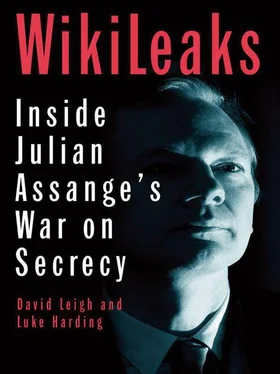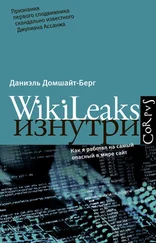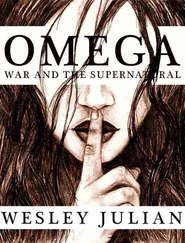Harding, Luke - WikiLeaks - Inside Julian Assange's War on Secrecy
Здесь есть возможность читать онлайн «Harding, Luke - WikiLeaks - Inside Julian Assange's War on Secrecy» весь текст электронной книги совершенно бесплатно (целиком полную версию без сокращений). В некоторых случаях можно слушать аудио, скачать через торрент в формате fb2 и присутствует краткое содержание. Жанр: Старинная литература, на английском языке. Описание произведения, (предисловие) а так же отзывы посетителей доступны на портале библиотеки ЛибКат.
- Название:WikiLeaks: Inside Julian Assange's War on Secrecy
- Автор:
- Жанр:
- Год:неизвестен
- ISBN:нет данных
- Рейтинг книги:3 / 5. Голосов: 1
-
Избранное:Добавить в избранное
- Отзывы:
-
Ваша оценка:
- 60
- 1
- 2
- 3
- 4
- 5
WikiLeaks: Inside Julian Assange's War on Secrecy: краткое содержание, описание и аннотация
Предлагаем к чтению аннотацию, описание, краткое содержание или предисловие (зависит от того, что написал сам автор книги «WikiLeaks: Inside Julian Assange's War on Secrecy»). Если вы не нашли необходимую информацию о книге — напишите в комментариях, мы постараемся отыскать её.
WikiLeaks: Inside Julian Assange's War on Secrecy — читать онлайн бесплатно полную книгу (весь текст) целиком
Ниже представлен текст книги, разбитый по страницам. Система сохранения места последней прочитанной страницы, позволяет с удобством читать онлайн бесплатно книгу «WikiLeaks: Inside Julian Assange's War on Secrecy», без необходимости каждый раз заново искать на чём Вы остановились. Поставьте закладку, и сможете в любой момент перейти на страницу, на которой закончили чтение.
Интервал:
Закладка:
Less comic was the overall tone adopted by the Americans towards their junior UK allies, who craved a “special relationship”. While there was evidence everywhere of the intimacy and intelligence-sharing which went on worldwide between the two Anglophone states, there were also signs of a condescending attitude. The cables showed that the US superpower was mainly interested in its own priorities: it wanted unrestricted use of British military bases; it wanted British politicians to send troops for its wars and aid its sanctions campaigns, against Iran in particular; and it wanted the UK to buy American arms and commercial products. Richard LeBaron, the US charge d’affaires at the Grosvenor Square embassy in London, recommended that the US continue to pander to British fantasies that their relationship was special: “Though tempting to argue that keeping HMG [Her Majesty’s government] off balance about its current standing with us might make London more willing to respond favourably when pressed for assistance, in the long run it is not in US interests to have the UK public concluding the relationship is weakening, on either side. The UK’s commitment of resources – financial, military, diplomatic – in support of US global priorities remains unparalleled.”
In the leaked cables, the unequal relationship between senior and junior partners was visibly played out. When then British foreign secretary David Miliband tried to hamper secret US spy flights from Britain’s Cyprus base, he was peremptorily yanked back into line. When Britain similarly thought of barring US cluster bombs from its own territory on Diego Garcia, the Americans soon put a stop to it. Britain even offered to declare the area around the US Diego Garcia base a marine nature reserve, so the evicted islanders could never go back. However, when Gordon Brown, as British prime minister, personally pleaded in return for compassion for Gary McKinnon, a British youthful computer hacker wanted for extradition, his plea was humiliatingly ignored. The incoming British Conservative administration, headed by foreign secretary-designate William Hague, lined up cravenly to promise the US ambassador a “pro-American regime”.
Sifting through this huge database of diplomatic documents, it was hard not to come away with a depressing view of human nature. Mankind, the world over, seemed revealed as a base, grasping species. Many political leaders showed remarkable greed and venality. One of the most egregious examples was Omar al-Bashir, the Sudanese president. He was reported to have siphoned as much as $9 billion out of the country, and stashed much of it in London banks. A conversation with the chief prosecutor of the international criminal court said some of the funds may be held by Lloyds Bank in London. The bank denied any connection.
It was a similar story in Afghanistan, a regime – like Russia – sliding into kleptocracy. The cables show fears of rampant government corruption; the US is apparently powerless to do anything about it. In one astonishing alleged incident in October 2009, US diplomats claimed that the then vice-president Ahmad Zia Massoud was stopped and questioned in Dubai, after flying into the emirate carrying $52 million in cash. Officials trying to stop money laundering interviewed him. Then they let him go. (Massoud denies this happened.)
The US was also deeply frustrated by Hamid Karzai, Afghanistan’s leader. It regarded him as erratic, emotional, prone to believing conspiracy theories – and linked to criminal warlords. US diplomats spelled out their conviction that Ahmed Wali Karzai, the president’s younger half brother and a senior figure in Kandahar, is corrupt.
Some of the world’s biggest companies have also been involved in dubious practices and dirty tricks, the communiqués alleged. Shell’s vice-president for sub-Saharan Africa boasted that the oil giant had successfully inserted staff into all of the main ministries of Nigeria’s government. Shell was so well placed that it knew of the government’s plans to invite bids for oil concessions. The Shell executive, Anne Pickard, told the US ambassador Robin Renee Sanders that Shell had seconded employees to every government department so knew “everything that was being done in those ministries”.
The revelations appeared to confirm what campaigners had long been saying: that there were intersecting links between the oil giant and politicians in a country where, despite billions of dollars in oil revenue, 70% of people still lived below the poverty line.
Pfizer, the world’s biggest pharmaceutical company, was also identified in Africa dispatches. According to a leaked cable from the US embassy in Abuja, Nigeria’s capital, Pfizer hired investigators to unearth evidence of corruption against the country’s attorney general. The drug firm wanted to pressure him to drop legal action over a controversial drug trial involving children with meningitis. Pfizer denies wrongdoing. It says it has now resolved a case brought in 2009 by Nigeria’s government and Kano state, where the drug was used during a meningitis outbreak.
*
What did this worldwide pattern of diplomatic secrets actually all mean? Some commentators saw it as proof that the United States was struggling to get its way in the world, a superpower entering a long period of relative decline. Others thought the revelations at least showed the bureaucracy of the state department in a fairly good light. In the Guardian , Timothy Garton Ash confessed he had been impressed by the professionalism of the US diplomatic corps – a hard-working and committed bunch. “My personal opinion of the state department has gone up several notches,” he wrote. “For the most part … what we see here is diplomats doing their proper job: finding out what is happening in places to which they are posted, working to advance their nation’s interests and their government’s policies.”
Some world leaders brushed off the embarrassing revelations, at least in public, while others went on the attack. Iran’s President Mahmoud Ahmadinejad, who did not come out well in the disclosures of his regional unpopularity, dismissed the WikiLeaks data drop as “psychological warfare”. He claimed the US must have deliberately leaked its own files in a plot to discredit him. Turkey’s prime minister, Recep Tayyip Erdoğan, reacted furiously to cables that suggested he was a corrupt closet Islamist. But in countries where there is no free press – Eritrea is a good example, but there are lots of them – there was no reaction at all, only silence.
The Russians executed a remarkable handbrake turn. President Medvedev at first dismissed the Russia cables as “not worthy” of comment. But when it became clear that the leak was far more damaging in the long-term to the US and its multilateral interests, one of Medvedev’s aides proposed, tongue-in-cheek, that Julian Assange should be nominated for the Nobel peace prize.
It was Assange himself that dominated the coverage in Australia. The Sydney Morning Herald hailed Assange as the “Ned Kelly of the internet age”, in reference to the country’s 19th-century outlaw folk hero. However, Australia’s prime minister, Julia Gillard, behaved more like the rest of the irritated world leaders: she condemned the publication as illegal, and Assange’s actions as “grossly irresponsible”. The cables themselves revealed an unflattering view of Australia’s political class. The former prime minister – now foreign minister – Kevin Rudd was called an abrasive, impulsive “control freak” presiding over a series of foreign policy blunders.
Was the Big Leak of the cables changing anything? As the year ended, it was for the most part too early to say. The short-term fall-out in some cases was certainly rapid, with diplomats shuffled and officials made to walk the plank. Der Spiegel reported that a “well-placed source” within the Free Democratic Party had been briefing the US embassy about secret coalition negotiations in the immediate aftermath of the German general election in 2009. The mysterious man was quickly outed as Helmut Metzner, head of the office of party chairman and vice-chancellor Guido Westerwelle. Metzner lost his job.
Читать дальшеИнтервал:
Закладка:
Похожие книги на «WikiLeaks: Inside Julian Assange's War on Secrecy»
Представляем Вашему вниманию похожие книги на «WikiLeaks: Inside Julian Assange's War on Secrecy» списком для выбора. Мы отобрали схожую по названию и смыслу литературу в надежде предоставить читателям больше вариантов отыскать новые, интересные, ещё непрочитанные произведения.
Обсуждение, отзывы о книге «WikiLeaks: Inside Julian Assange's War on Secrecy» и просто собственные мнения читателей. Оставьте ваши комментарии, напишите, что Вы думаете о произведении, его смысле или главных героях. Укажите что конкретно понравилось, а что нет, и почему Вы так считаете.












